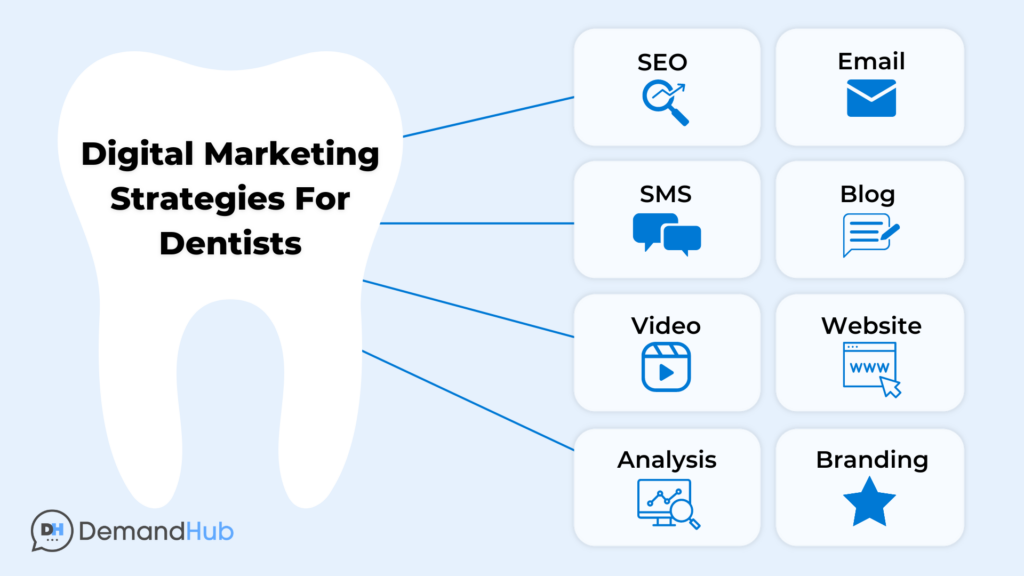In the digital age, a strong online presence is crucial for any business, and dental practices are no exception. A key aspect of this is Search Engine Optimisation (SEO), a strategy used to increase a website’s visibility on search engines. Dental SEO, in particular, can be a game-changer, helping practices attract new patients and engage existing ones. This article will delve into two critical components of SEO: namely, On-Page and Off-Page SEO. Both play a vital role in improving a dental website’s ranking on search engines like Google. However, understanding their differences, strengths, and how they complement each other can be the difference between a thriving dental practice and one that’s struggling to attract new patients. So, let’s dive in and explore the world of Dental SEO.
Understanding the Basics of SEO

SEO is a digital marketing strategy that aims to improve a website’s visibility on search engine results pages (SERPs). It involves various techniques and practices designed to make a site more attractive to search engines. The goal is to appear as high as possible on SERPs, ideally on the first page, as this is where most users click. SEO is particularly important for dental practices, as it can help attract new patients who are searching for dental services online. There are two main types of SEO: On-Page and Off-Page SEO. Both are crucial for a successful SEO strategy, but they focus on different aspects of your website and online presence. Understanding these basics is the first step towards leveraging Dental SEO to its full potential.
On-Page SEO: A Closer Look
On-Page SEO refers to the optimisation of elements within a website. This includes content, HTML source code, and site architecture. The goal is to make the site as ‘search engine friendly’ as possible. For dental websites, this could involve using relevant keywords in the content, such as ‘dental check-up’ or ‘teeth cleaning’, ensuring the site loads quickly, and making it easy for users to navigate. On-Page SEO also involves creating high-quality, informative content that provides value to visitors. This not only helps to improve a site’s ranking on SERPs but also encourages users to spend more time on the site and potentially book an appointment. In essence, On-Page SEO is about creating a website that both search engines and users love.
Off-Page SEO: Beyond Your Website

Off-Page SEO, on the other hand, involves strategies that go beyond the website itself. It focuses on increasing the site’s credibility and trustworthiness through link building, social media marketing, and online reputation management. For dental websites, this could involve getting backlinks from reputable dental associations, engaging with patients on social media, and encouraging positive reviews. Search engines view these activities as endorsements of a site’s quality, which can significantly boost its ranking on SERPs. However, Off-Page SEO requires ongoing effort and a strategic approach. It’s about building relationships and establishing a strong online presence that reflects the quality of your dental practice.
The Interplay Between On-Page and Off-Page SEO
On-Page and Off-Page SEO are two sides of the same coin, each playing a crucial role in a successful Dental SEO strategy. On-Page SEO ensures your website is user-friendly and contains relevant, high-quality content, while Off-Page SEO enhances your online reputation and credibility. They work together to improve your website’s visibility on search engines. For instance, high-quality content on your website (On-Page SEO) can earn you backlinks from reputable sources (Off-Page SEO). Similarly, a strong online reputation (Off-Page SEO) can increase traffic to your site, which can then be converted into patients through an effective website design and content (On-Page SEO). Understanding this interplay is key to creating a balanced and effective SEO strategy for your dental practice.
Why Dental Websites Need a Balanced SEO Strategy
A balanced SEO strategy is vital for dental websites. It’s not enough to focus solely on On-Page or Off-Page SEO; both are necessary for a robust online presence. On-Page SEO ensures your website is optimised for both users and search engines, with relevant content and a user-friendly design. Off-Page SEO, meanwhile, builds your site’s credibility and online reputation. Together, they increase your visibility on search engines, helping to attract potential patients. Moreover, a balanced SEO strategy can provide a better user experience, encouraging visitors to spend more time on your site and potentially book an appointment. In the competitive field of dentistry, a well-rounded approach to Dental SEO can give your practice the edge it needs to stand out online.
Case Study: The Impact of SEO on Dental Websites
Consider a dental practice that implemented a balanced SEO strategy. They optimised their website’s content and design (On-Page SEO) and built a strong online presence through social media and backlinks (Off-Page SEO). Over time, their visibility on search engines improved, leading to an increase in website traffic. More importantly, this traffic was highly targeted, consisting of individuals searching for dental services. As a result, the practice saw a significant increase in new patient bookings. This case study illustrates the power of Dental SEO. By focusing on both On-Page and Off-Page SEO, the practice was able to attract more potential patients and convert them into actual patients, demonstrating the tangible impact of a well-executed SEO strategy.
Final Thoughts: Crafting Your Dental SEO Strategy
Crafting a successful Dental SEO strategy requires a balanced approach, focusing on both On-Page and Off-Page SEO. On-Page SEO ensures your website is optimised for search engines and users, with relevant, high-quality content and a user-friendly design. Off-Page SEO enhances your online reputation and credibility, helping to build trust with search engines and potential patients. Together, they can significantly improve your visibility on search engines, attracting more potential patients to your site. Remember, SEO is a long-term strategy that requires ongoing effort and adaptation. But with a well-crafted Dental SEO strategy, your practice can thrive in the digital age, attracting new patients and engaging existing ones more effectively than ever before.

